#Skin Lightening products
Explore tagged Tumblr posts
Text
BALITANG REHIYONAL: An Illicit Skin Lightening Products from Pakistan found Mercury-contaminated cosmetics in Tacloban City, says Toxics and Environmental Watchdog Group

TACLOBAN, LEYTE -- Environmental watchdog group 'BAN Toxics' recently exposed the unlawful sale of three (3) variants of 'Goree' skin lightening products (SLPs) which previously banned by the Philippines' Food and Drug Administration (FDA) in the late mid-October 2017 due to health damaging mercury concentrations.
In an exclusive market surveillance conducted by the BT Patrollers, the said group discovered the localized over-the-counter (OTC) sale of Goree Beauty Cream with Lycopene Avocado & Aloe Vera, Goree Day & Night Beauty Cream Oil: Free Total Fairness, and Goree Gold 24K Beauty Cream, pricing at PHP300 to PHP350 (roughly between U$D5.15 to U$D6.00 or PKR1,425.76 to PKR1,663.39) in beauty and wellness shops along downtown area within this week by the end of May 2024 in Tacloban City, Leyte.
Using a chemical XRF (X-Ray Fluorescence) analyzer to determine mercury concentration, the group found that 'Goree Beauty Cream' with Lycopene Avocado & Aloe Vera had 21,700 parts per million (ppm) of mercury, 'Goree Day & Night Beauty Cream Oil: Free Total Fairness System' had 22,900 ppm; and 'Goree Gold 24K Beauty Cream' had 21,800 ppm. All of these unsuspected skin creams from a manufacturer source out of Pakistan have existing public health warnings against their use and sale due to toxic mercury content.
Cited at the end of October 2017 advisory as one former director general of Philippines' FDA named Ms. Nela Charade G. Puno: "Mercury salts in cosmetic products inhibit the formation of skin melanin which will result in lighter skin tone. Adverse health effects brought by high toxic mercury in cosmetics products include kidney damage, skin rashes, skin discoloration and scarring. Chronic use reduces the skin's normal resistance against bacterial and fungal infections. Other effects include anxiety, depression or psychosis and peripheral neuropathy", the advisory stated.
As you may really notice when you check and read the label first, if you are attempting to purchase an imported Pakistani-based skin lightening product of 'Goree', these cosmetic products won't show a list about "mercury" in the ingredients label after they finally come out from the factory and later imported globally.
Thony Dizon, whose a Toxics Campaigner of the group told local media reporters: "The proliferation of such prohibited beauty cosmetics in cities and provinces nationwide must end and should be addressed immediately by regulatory agencies. We call the attention of the FDA in Region 8 to conduct post-marketing surveillance and enforcement action to stop the sale and use of these banned toxic products", he added.
Around late-April 2024, 'BAN Toxics' launched a video documentary titled "The Dark Side of Skin-Lightening" - a 13-minute documentary film shedding light on the hidden dangers lurking within many SLPs due to their mercury content.
The watchdog group of 'BAN Toxics' continuously monitors and documents the illegal trade of banned and prohibited beauty products sold in the local market in the entire region of Leyte, and online (such as Shopee and Lazada) to warn the public about the dangers of toxic mercury exposure and to protect human health and the environment from mercury-added cosmetics.
The documentary reveals that many mercury-added SLPs continue to proliferate in the local market despite being banned by the FDA. It includes market monitoring conducted by the group in both online and physical stores, showing how easy it is to buy several illicit brands such as Goree, 88 Total White, Collagen Plus, Faiza and among others. This aims to raise public awareness, advocate for robust regulations & enforcement policies, and promote international collaboration as key measures to address the issue of mercury-added SLPs.
Because of the illegal cosmetic SLP imports including 'Goree' family of products to be unexpectedly go on sale in-store or online, the beauty faces of Filipinos who are allegedly using it are in for a nationwide public health concern that will save you money from your fashion disaster of life.
PHOTO COURTESY: BAN Toxics via PR BACKGROUND PROVIDED BY: Tegna
SOURCE: *https://www.facebook.com/100064702179348/posts/885140493652682 [Referenced PR Article via BAN Toxics] *https://www.kwentongofw.com/2018/06/everything-you-need-to-know-about-goree/ [Referenced Classic News Article via Kwentong OFW] *https://www.fda.gov.ph/wp-content/uploads/2022/05/FDA-Advisory-No.-2017-289.pdf [Referenced Advisory from FDA-PH] *https://journal.com.ph/warning-pakistan-made-goree-gold-beauty-cream-24k-contains-toxic-mercury/ [Referenced News Article from People's Journal] and *https://iprice.ph/goree/ [Referenced Price Listings via iPrice]
-- OneNETnews Online Publication Team
#regional news#tacloban#leyte#BAN Toxics#goree#goree beauty cream#pakistan#consumer watch#awareness#health concern#skin lightening products#not sponsored#fyp#OneNETnews
0 notes
Note
Hi! So I tried not to say anything about some anti makeup posts I saw on your blog but I need to say this. I think you're very wise and I agree it's very important for us to love ourselves as we are. But some people like myself doesn't care about 'empowering' of makeup or whatever but we just have fun with it and we just love it. I say we because I know there is a lot of people like me. Yeah, we are feeding capitalism or whatever, but world is beautiful and it's also terrible so people trying make themselves feel good, have fun, ect. I see a lot of people who don't wear makeup and i'm happy for them! I didn't wear makeup until i turned 20 i think and felt good.
One thing I wanted to add is in response of post about feminine girls. I think everything needs balance and sometimes people tend to overreact in their opinion and divide everything in black and white. Personally I never cared how women around me looked and what they were wearing. But I would like to have same treatment, and not to feel silly for wearing pink or feminine clothes.
Sorry, I don't know English very well so maybe I can't translate my idea entirely. What I'm trying to say i think everyone should do what they like and leave each other in peace.
Sorry for this essay, just wanted to share my point of view.
Hi, anon! I'm sorry for the delay in getting to this, but I appreciate you writing this (and your English was fine, don't worry)
I think the main argument of those posts (and my own feelings about this) is not about makeup on its own, or even judgement about who does and doesn't choose to wear it--what they are criticizing is a particular part of the society we live in which puts a huge emphasis on women's beauty and appearance in order to fulfill an idea of what a woman "should" be, and the role that makeup plays in that as a result. Because whether we like it or not, whether we believe in them or not, whether we feel pressured by them or not, these expectations do exist. How we personally respond to them does not change that.
I personally don't have an issue with makeup or the concept of it (in almost every culture on earth, humans have been using makeup of some kind for literally thousands of years)--but what I do have a problem with is when we treat makeup, or other traditionally "feminine" forms of expression as neutral things when they are not. A comb or a hair tie is neutral--it's just a thing. Lipstick and eyeliner are also just things, but only when they exist by themselves--and in reality they don't exist by themselves: they exist in a world where we value women on their physical appearance before we value them for anything else--lipstick and eyeliner exist to emphasise parts of your appearance, to make you look a certain way--and in a society where we put so much importance on women looking a certain way, they aren't just ordinary things you toy around with for fun. You can have fun with them, but it doesn't change their role. They can't be treated as exceptions from the world they are used in.
I think sometimes people assume that being anti-makeup is the same as being anti-women-who-wear-makeup, which misses the point (and also suggests a very dangerous idea which I think, sometimes, is why people respond so angrily to these criticisms: because if we believe that being anti-makeup = being anti-women, then therefore makeup = womanhood, and this is simply not true). Whether you wear these things just for fun and to enjoy yourself isn't what is being talked about because these criticisms are not about you on a personal level: they are about looking at a society that is as image-obsessed as ours, and asking why makeup has the role that it has when 1) it is almost exclusively aimed at women--women who, as a group, have been historically marginalised, and whose value, historically, has almost always been measured in terms of their beauty before anything else and 2) the makeup that is emphasized, the trends and styles that come and go, are often not so much about self-expression (if they were, people would be freely wearing all sorts of wild colours and styles: when we talk about "makeup culture" it's not the same kind of makeup used in the goth, punk, or alt scenes for example where makeup plays a very different role) but almost always about achieving or aspiring towards a type of beauty that is valued or expected: to make you look younger, to make your eyes brighter or larger, to make your lips bigger or sexier, your cheekbones more prominent etc--again, on their own, these things may not be a big deal, but they exist in a world where having these looks means you are valued in a certain way as a woman. And when this exists in our kind of world, where the power dynamics we have automatically mean women's perceived power is through beauty, and where we insist so much on women being a particular kind of beautiful (and this starts in childhood) we have to ask and investigate WHY that is--why this type of beauty and not another? why (almost only) women? who benefits from this? who suffers as a result?
The argument of "not all women" wear makeup for empowerment misses the point of these criticism, because it is focusing on a person's individual choices in a way that suggests our choices can define the world we live in, and they can't. We are deeply social animals. Therefore, how we appear to each other and to ourselves is a socially influenced phenomenon. This applies for race, for sexuality, and for gender. How women are perceived at large, in different social structures, is a social phenomenon influenced by the societies we exist in and the values of those societies. These criticisms are about the society we make those choices in and how that can affect us. For you, makeup may be something fun and enjoyable and that's fine. I'm not saying that's untrue or that people don't feel this way or that you are wrong for feeling this way. It's also not saying that you are brain-washed or oppressing yourself for it. But it doesn't change the world we live in. Someone feeling perfectly happy to go out with makeup or without makeup, and feeling no pressure to do either, is great--but it doesn't mean there aren't a lot of women who do feel pressured into wearing it, and that pressure is a social one. It doesn't change the inequality that exists between how women's physical appearances are judged compared to men's. It doesn't change the fact that almost every childhood story most kids hear (that aren't about animals) have a "beautiful princess" (and very little else is said about her except that she is beautiful) and a "brave" knight/prince/king/whichever: the princess (or maiden or whatever young woman) is defined by how she looks; the male in the story by how he acts.
It also doesn't change the fact that so many young girls grow up hearing the women around them criticize various parts of their bodies and that they carry this into their lives. It doesn't change the fact that we expect (in Western countries at least) for women to have criticisms about their appearance and they are "stuck-up" or "full of themselves" if they don't. It doesn't change the fact that magazines photos, red carpet photos, films, tv shows etc., feature actresses who are beautiful in a way that is absolutely above and beyond exceptional (and who either have had work done cosmetically, or are wealthy enough to be able to afford to look the way they do through top-class makeup artists, personal trainers etc) but who we think are within the "normal" range of beauty because faces like theirs are all that we see--how many famous actors / entertainers can you name who look like they could be someone's random uncle, or "just some guy" (writing this, I can think of 5). Now how many actresses, equally famous, can you think of that are the same? Very, very, very few.
The point of those posts, and why I feel so strongly about this, is that we have a deeply skewed view of beauty when it comes to women, because, as a society, we place so much on how they look in such a way that it is not, and was never meant to be, achievable: therefore anything that contributes to how women look, that markets itself in the way that the makeup industry does in this day and age, needs to be questioned and looked at in relation to that. No one is saying don't wear eyeliner or blush--what they are trying to say is that we need to be aware of the kind of world eyeliner and blush exists in, what their particular functions as eyeliner and blush do in the world that they exist in, that we exist in, and how this does impact the view we have on makeup as a result. Your personal enjoyment may be true to you and others, but this doesn't change the role of female beauty in the world because, again, our personal choices don't define the world in this way. Often, it's the other way around. And we cannot deny this fact because, while it may not affect you negatively, it does affect others.
I absolutely agree with you because I don't care how other women around me choose to dress or express themselves, either--that's their freedom to wear what they want and enjoy themselves and I want them to have that freedom. But my view is not the world's view, and it's certainly not the view of a lot of other people, either. I don't care if another woman loves pink and wearing skirts and dresses--but, like makeup, pink, skirts, and dresses, are not neutral things either. They're tied to a particular image of 'femininity' which means they are tied to a particular way of "being a woman" in this world. I'm not saying, at all, that it's wrong to wear these things. But I'm saying we can't treat them as though these are choices as simple as choosing what kind of socks to wear, because they aren't. They are choices that have baggage. If a woman is seen as being silly, childish, or treated unequally because she enjoys cute tops and ribbons and sundresses, that's not because we are demonizing her choices, or because being anti-makeup is being anti-woman (again, it is absolutely not): it's because we as a society demonize women for any choice. That isn't because of anti-makeup stances--that's because of sexism.
You mentioned that you want to be treated the same as anyone else for wearing feminine clothes--but the fear that you wouldn't be isn't because of the discussions critiquing makeup and other traditionally "feminine" things--it's because we live in a society where women are constantly defined by how they appear on the outside, and no amount of our personal choices will make this untrue. Whether you are a girly-girl or a tomboy, you'll always be judged. And, in reality, when women follow certain beauty standards they do get treated better--but this doesn't mean much in a society where the standards are so high you can never reach them, and where the basic regard for women is so low to begin with (not to mention the hypocrisy that exists within those standards). This is what all those criticisms towards makeup and "empowerment" are about: it's about interrogating a society that is built on this kind of logic and asking why we should insist on leaving it as it is when it does so much damage. It's saying that that if we want everyone to truly feel free in how they choose to present themselves we have to go deeper than just defining freedom by these choices on their own, and look at the environment those choices are made in. And that involves some deeply uncomfortable but necessary conversations.
Also, and I think this important to remember, views on makeup and the social place of makeup will also depend on culture and where you are, and the beauty expectations you grew up with. And when it comes to the internet, and given American dominance online, a lot of these posts criticizing makeup and the way makeup is being used to sell an idea that wearing it is "empowering" to the woman (which is basically saying: you are MORE of a woman when you wear it; you are stronger and more powerful because, in our society, beauty is portrayed as a form of power: it tells you, you can battle the inequality women face by embracing the role beauty plays in our lives but it doesn't tell you this emphasis on beauty is part of that inequality), are based on the way makeup is portrayed in mostly English-speaking Western countries. My views are shaped by what I grew up seeing, and while a full face of makeup (concealer, primer, foundation, mascara, highlighter, contour, blush, brow tint, brow gel etc) may not be daily practice or even embraced in a place like France or maybe other places in mainland Europe (but that doesn't mean they don't have their own expectations of feminine beauty), they are daily practice in places like the US and Britain, and this is what most of those posts and criticisms are responding to.
We can argue as much as we want about makeup, but when you grow up in a society where women feel the need to put on makeup before going to the gym there is something seriously wrong. Embracing makeup and enjoying makeup is one thing, but it cannot be a neutral thing when so much of it is about looking like you're not wearing makeup at all, or when we assume a woman is better qualified for a job or more professional when she wears it. It cannot be a neutral thing when a singer like Alicia Keys goes makeup-free for a red carpet event and it causes a stir online because people think she looks sick (what she looks like is normal--I would argue above normal--but wearing makeup to cover up "flaws" is so normal now that we genuinely don't know what normal skin is supposed to look like because the beauty of these celebrities is part of their appeal: they are something to aspire to). It is absolutely very normal for me, where I am, to see young girls with fake lashes and filled in brows: it's not every girl I pass, but it is enough. I'm not saying they are miserable, or brain-washed, or should be judged. I can believe that for them it's something enjoyable--but how am I supposed to see something like that and not be aware of the kind of celebrities and makeup tutorials that are everywhere on TikTok and YouTube, and that they are seeing everyday? How am I not supposed to have doubts when people tell me "it's their choice!" when the choices being offered are so limited and focused on one thing?
I never wore makeup as a teenager and I still don't, but a lot of that is because I grew up surrounded by people who just didn't. Makeup was never portrayed as anything bad or forbidden (and I don't see it like that either)--it was just this thing that, for me growing up, was never made to be a necessity not even for special occasions. I saw airbrushed photos and magazines all around me, for sure, and I definitely felt the beauty pressure and the body pressure (for example, I definitely felt my confidence would be better if I wore concealer to deal with my uneven skintone, and I felt this for years). But I also know that, growing up, I saw both sides. No makeup was the default I saw at home, while makeup was the default I saw outside. And that does play a part, not just in the choices you make, but in the choices that you feel you are allowed to make. No makeup was an option for me because it was what I saw everyday, even with my own insecurities; but if you do not see that as an option around you (and I know for most girls my age, where I grew up, it probably wasn't) then how can we fully argue that the decision you make is a real choice?
If I wanted to wear a cute skirt outside, for example, and decided to shave my legs--that isn't a real choice. And it cannot ever be a real choice, no matter how much I say "this is for me" or "I prefer it like this" because going out in public with hairy legs and going out in public with shaved legs will cause two completely different reactions. How can I separate what I think is "my choice" from a choice I make because I want to avoid the negative looks and comments? And how can I argue that choosing to shave is a freely made choice when the alternative has such negativity? If you feel pressured into choosing one thing over another, that's not a choice. Does this make sense?
This is how I feel about makeup most of the time, and what I want more than anything else is for us to be able to have a conversation about why we make the choices we do beyond saying "it makes me feel good" and ending the conversation there. Again, I'm not saying people need to stop wearing makeup or stop finding enjoyment in wearing it, but I think we tend to get so focused on our own feelings about this and forget that there is a bigger picture and this picture is a deeply unequal one. That is what this conversation is about. I hope this explains some things, anon, and if I misinterpreted anything please feel free to message me again. x
#i think in essence what i'm trying to say is that#some things are true in a microcosm but you cannot make a universal application for them bc the microcosm isn't representative of the whole#and it is dangerous to assume that it is or that it can be bc you're erasing the bigger picture when you do that#it would be like a poc saying they never felt the pressure of skin-lightening creams which is amazing but it doesnt change the fact that a#whole industry exists selling skin-lightening products BECAUSE there is a demand for them and that demand exists BECAUSE there is an#expectation that they SHOULD be used and this is because there is a belief that lighter skin = more beautiful. regardless of how messed up#and damaging that logic is that doesn't mean it doesn't exist in the world#and therefore those industries exist to maintain that belief because that belief is what drives their purpose and their profits#and we are doing no favours to the countless poc who DO feel pressured to subject their skins to these products or who come away with#a deeply damaged sense of self-worth (not to mention the internalised racism that's behind these beliefs) bc of constantly being told they#are less than for being darker than a paper bag which is RIDICULOUS#saying its all down to choice is not far off from saying you can CHOOSE to not be affected by the pressure but like....that's just not true#you can't choose to not be the recipient of colorism any more than you can choose to not be the recipient of sexism. and its putting a huge#amount of pressure and responsibility for an individual to just not be affected by deeply ingrained societal pressures and expectations whe#what we SHOULD be doing is actually tackling those expectations and pressures instead#they are leaving these systems intact to continue the damage that they do by making everything about what you as an individual think and#believe but while we all ARE individuals we dont live in separate bubbles. we are part of and IN this world together. and it acts on us as#much as we act on it. but like.....i think i've gone on enough already#ask#anonymous
102 notes
·
View notes
Text
Is CloverWorks entirely at fault for TPN S2's mangled production?
I see so many people default to blaming CloverWorks for being the sole arbiter of S2's horribly disappointing production (sometimes Shirai is added into the mix too, especially by anime-onlys), but every time I do I'm genuinely asking the question of whether that's true and where they're pulling their information from.
I'm not involved in the animation industry at all so I'm interested in receiving input from people who are more familiar with it, but my understanding is the people in charge of the decision to truncate S2 would be The Promised Neverland Committee listed at the end of the opening credits.

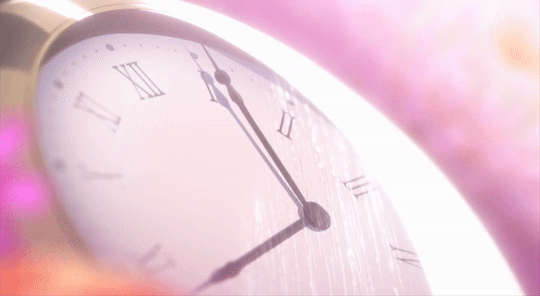
(I could not find a single video of the English dub that aired on [adult swim] for the English credits of S1, so a screencap from the Japanese credits)
TPN Committee is comprised of the following entities: Aniplex (Distributor), Fuji TV (TV Station), Shueisha (Manga Publisher), Cygames Anime Fund, Dentsu (ads)
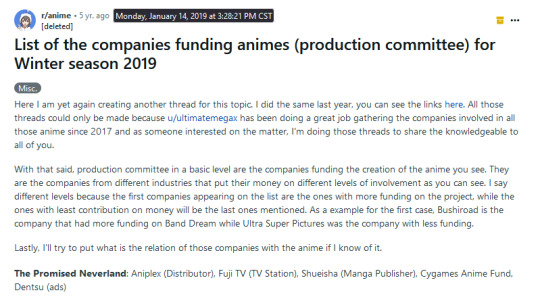

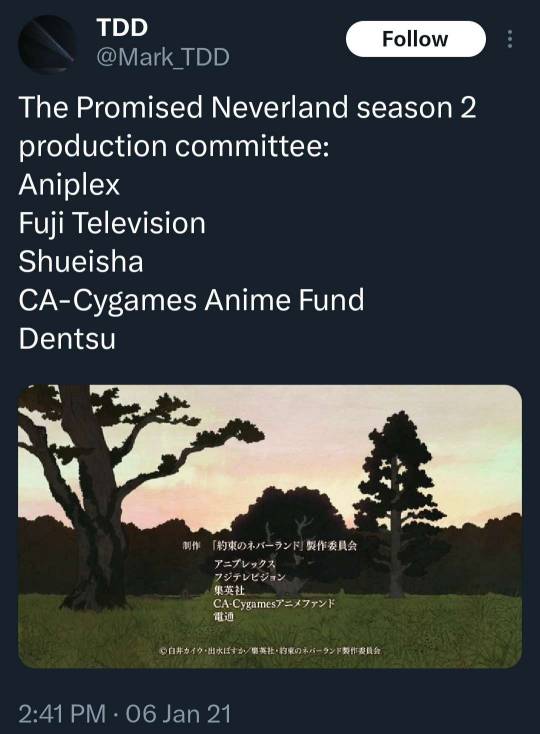
(Sources 1 | 2 | 3)
kViN from Sakugabooru details what a production company is in this post:
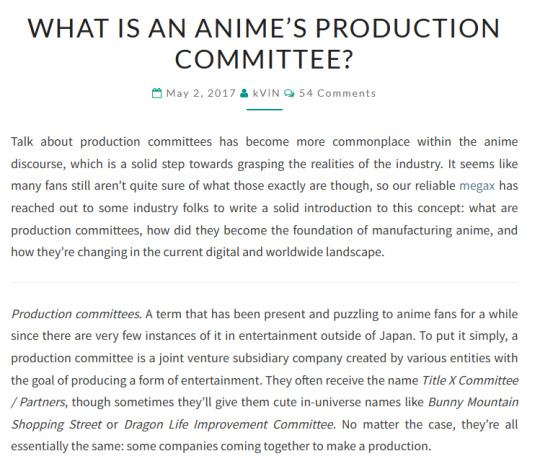
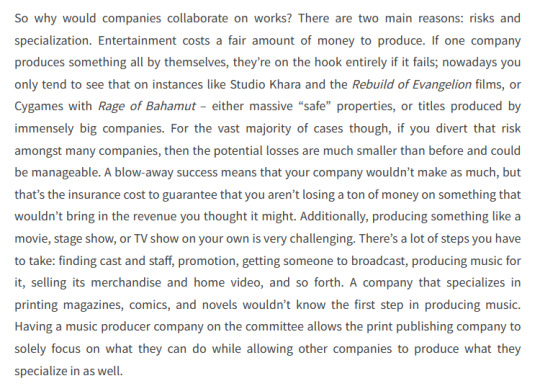


"I personally find it enjoyable to see who is involved in a show, and as you’ve seen there is plenty of information to draw from that. Animation production studios are listed in the credits for each show, so it’s understandable why audiences would imagine they have a ton of influence over a production. It’s even natural to think that the company that is actually manufacturing something would have great input! If you start paying attention to these committees though, you get a clearer picture of the finances of production and how each show is actually made rather than assume that studios that often don’t have much of a say are in charge of everything."
And CloverWorks is the more prominent name, especially for English speakers watching the subbed version of the series.
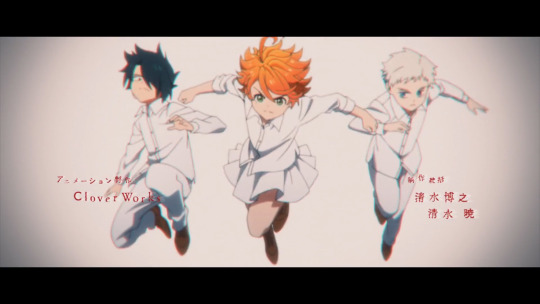

This is also something that Geoff Thew brings up in the last seven minutes of this video around the 18:50 mark:
youtube
"I'd bet good money that the last credits were supposed to roll right after that big stone door slammed shut, and I'd further wager that a combination of fan reactions to and dipping ratings for early episodes is what caused the production committee—who are the ones who actually have final say in this, not Cloverworks or even Shirai—to cut their losses and turn that cliffhanger into a skeleton of a conclusion."
I disagree with him on them making the call to retool the series during the clipshow episode between S2e05 and S2e06 though. It doesn’t seem like they had enough time to do that when a single episode of animation takes on average nine months to complete, even with the ridiculous crunch they seemed to be in. My guess is it was made back in early 2020 after Shirai made everyone involved in production aware the manga was ending that year, with the pandemic potentially factoring in to a degree.
He also mentions this a bit earlier:
"It's just such a slap in face to anyone who ever gave a shit about any version of this story. Including the people telling it, apparently, since neither of the anime's screenwriters nor mangaka/series composer Shirai wanted to take credit for the last two episodes. They probably didn't have much say in how it all went down. That's important to keep in mind before you start yelling at animators or even studios on twitter. I guarantee that every adaption that hurts you personally was ten times harder on the people who actually had to make it. As hackishily slapdash as this finale is, a lot of people probably slept under their desks to get it out the door, if they slept at all."
I always come back to this tiny addition toward the end of S2 episode 2 as an indication that on the creative side of things, in storyboarding and animation at CloverWorks, the care was still there at some level.


It was just squashed down in order to cut and condense 146 chapters into 11 episodes for a production that, as ZersEditor puts here, was "bleeding money."


But CloverWorks is less to type out, so they get the majority of the ire over a tragically butchered production in casual conversation.
#The Promised Neverland#Yakusoku no Neverland#TPN#YnN#約束のネバーランド#約ネバ#Kaiu Shirai#CloverWorks#TPN Committee#FSS Chatter#TPN S1#TPN S2#TPN S2e02#Long Post#I'm not trying to portray CW as a saint of a studio because again I'm not involved in the industry so I don't know all the nuances to it#and this production of theirs is the one I'm most familiar with‚ with the other one being S×F for comparison#and like Ruby's pointed out in another post I can believe they're complacent in the lightening of skin tones for characters of color#as part of a larger industry-wide trend which is still shitty and should be critiqued#but I don't think they're the only ones guilty of this#so it kind of deflates me a bit when I see people comment on my posts taking a dig at CW#because it feels like a pithy comment of misdirected ire when the body of people actually at fault#get to continue on with their business of utilizing stories as investments to build up portfolios#instead of any genuine interest in a series' story or artistic merits#so then I kind of zone out even if I agree with the spirit of the sentiment of grieving over a series you care about#like “is it their fault? is it? are we talking about the same thing/on the same page here?”#tbf people are probably making more productive use of their time than I am#after delving into this for a sense of personal closure on how S2 turned out the way it did lol#but if anyone has any further reading on the subject or personal insight and feels like sharing I'd be interested#either in CW's favor or against
22 notes
·
View notes
Text
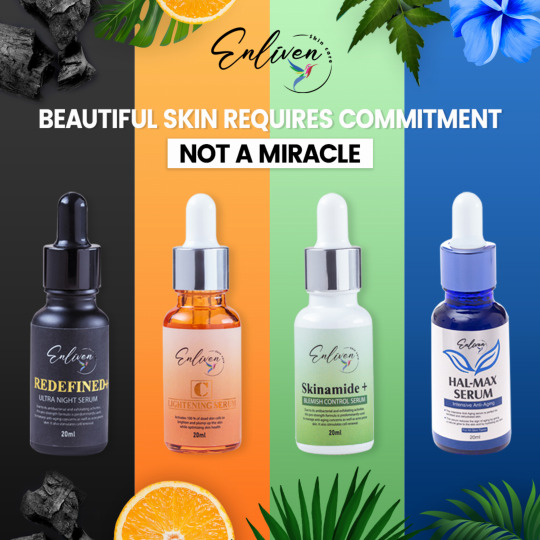
We, at Enlivens Skincare, believe that nature has the power to bring out the true radiance of your skin. That is why we have brought out nature’s finest ingredients in the form of our products. We have made sure that our products are completely free of harmful chemicals and additives. For More Information Contact Us [email protected] 03300007546 https://enlivenskincare.pk/
#skincare products#best skin care products in Pakistan#best anti aging cream in pakistan with price#buy Anti Aging Serum#skin products#best skin care products#Derma Fair Facewash#radiglow facewash#redefined plus night serum#vitamin c lightening serum
2 notes
·
View notes
Text

The Skin Lightening Products Market is experiencing significant growth, driven by rising consumer interest in skincare and personal grooming, particularly in regions where a lighter skin tone is culturally preferred.
0 notes
Text
0 notes
Text
Glow Naturally with Oshea Herbals’ Glopure Lightening Facepack!
Unveil your skin’s true radiance with Glopure! 🌿 Infused with the goodness of pea and liquorice, this lightening face pack hydrates, evens your skin tone and enhances your natural glow.
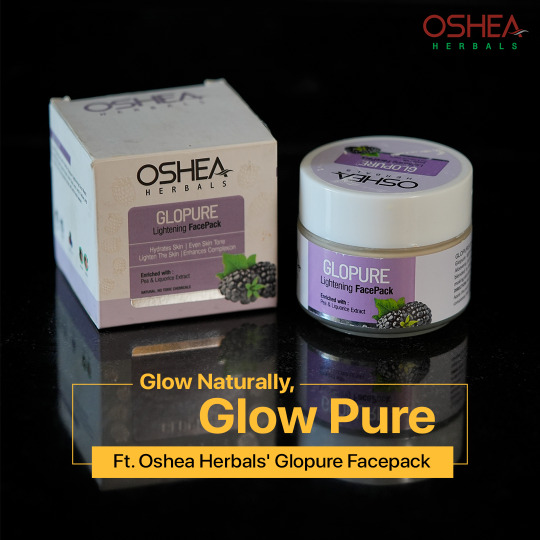
Perfect for brightening up your complexion, Glopure Facepack is your go-to skincare essential. 🌟 Enhance your beauty naturally! Shop Now #RadiantSkin #NaturalGlow #SkincareEssentials #GlopureFacepack #HealthySkin #EvenSkinTone #BeautyEssentials #OsheaHerbals
instagram
#facepack#face pack#lightening#lightening facepack#beauty products#skin care#skin products#oshea herbals#Instagram
0 notes
Text
Skin Brightening Serum: Unlock Radiance with The Pink Foundry’s Vitamin C Formula
Unveil your skin’s natural radiance with The Pink Foundry's Vitamin C Skin Brightening Serum. This powerful formula helps to brighten your complexion, reduce dark spots, and even out skin tone. Perfect for daily use, our serum will leave your skin glowing and revitalized. Try it and experience the difference in your skin’s brightness and clarity!
#Best face serum for glowing skin#skin whitening serum#skin brightening product#best face lightening serum
0 notes
Text
Ditch the Skincare Struggle! BeautyGods to a Flawless Complexion
Say goodbye to skincare woes and hello to radiant skin with BeautyGods! Our expertly formulated products are your ultimate solution to achieving a flawless complexion. Whether you're battling blemishes, uneven skin tone, or dryness, BeautyGods has the perfect remedy. Packed with natural ingredients, our skincare line nourishes, revitalizes, and protects your skin, giving you that coveted glow. Stop struggling and start shining—let BeautyGods transform your skincare routine today!
#brightening cream#natural face cream#skincare#whitening face cream#lightening cream#skin brightening product#natural beauty cream#natural brightening face cream
0 notes
Text
Healthy Skincare Routine for Smooth and Radiant Facial Skin
Achieving Smooth and Soft Facial Skin: Tips for a Healthy Skin Regimen and Radiance Skincare, it is important to prove a consistent and comprehensive skincare routine. Here are some essential tips to help you meet that radiant glow: Cleansing: Use a gentle cleanser suitable for your skin type like Samhealthyskin Seaweed Milk Cleanser to remove dirt, oil, and impurities, allowing your skin to…
#healthy skin brightening#healthy skin essentials#healthy skin face#healthy skin foundation#healthy skin glows#healthy skin lightening#healthy skin natural remedies#healthy skin products#healthy skin shiny
0 notes
Text
The Psychosocial Impact of Colorism and Skin-Lightening on Female University Students in Ghana
Join Dr. Patrice Le Goy for a deep dive discussion titled “The Psychosocial Impact of Colorism and Skin-Lightening on Female University Students in Ghana” at the virtual Ronald E. Hall Conference on Colorism taking place on August 22, 2024 and August 23, 2024. Register today: Ronald E. Hall Conference on Colorism Deep Dive Discussion Session : 1-B Session: The Psychosocial Impact of…
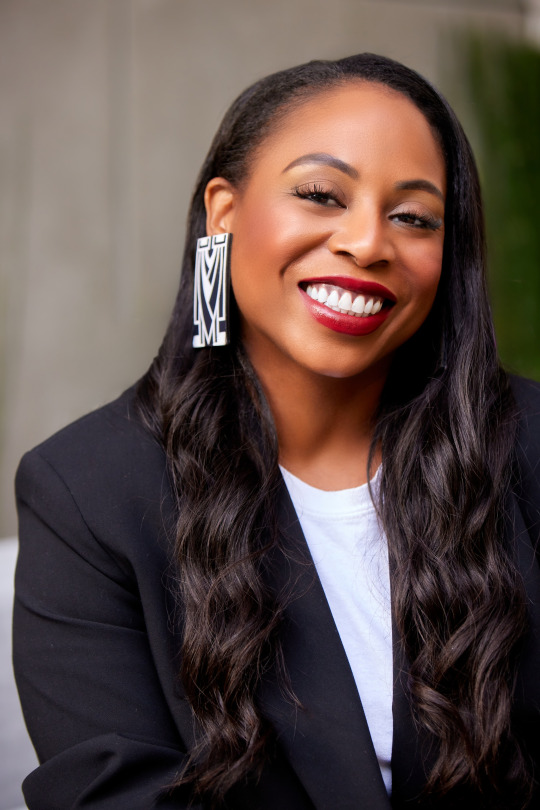
View On WordPress
#Colorism#Dr. Patrice Le Goy#products used to lighten skin#Skin-lightening products are often unregulated#skin-lightening products as a worldwide phenomenon#Women in Ghana and skin lightening products
0 notes
Text
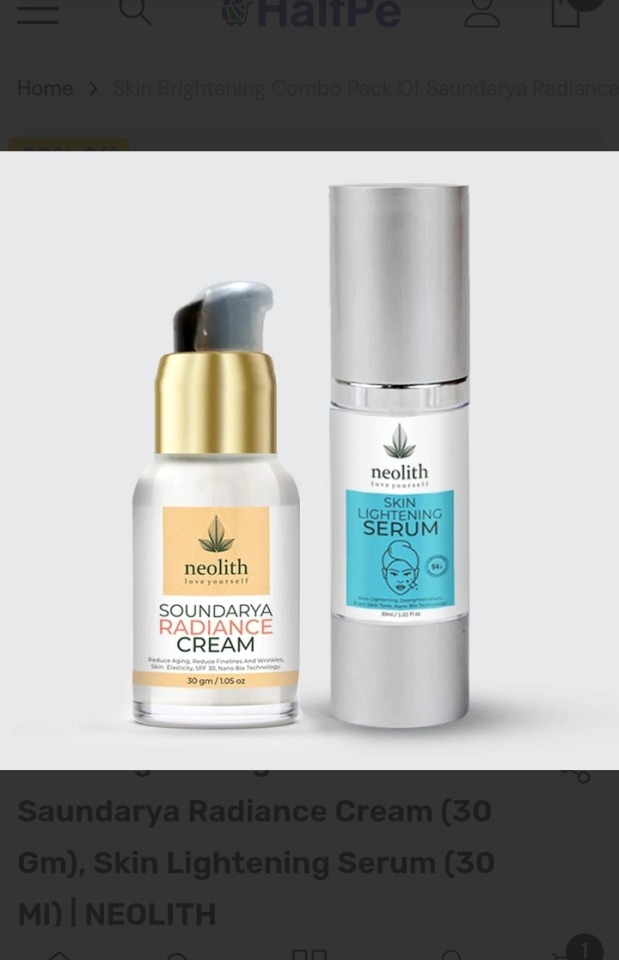
Grab the products deals on halfpe.com
0 notes
Text
Getting Brighter Skin in Hyderabad: Easy Skin Lightening Treatments
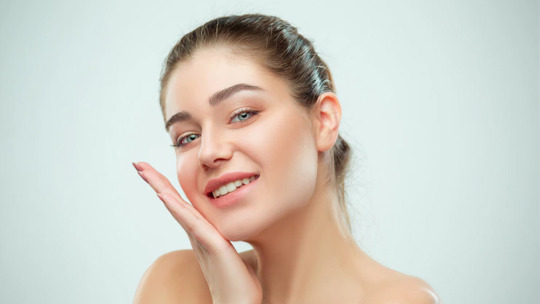
In Hyderabad, where everyone loves having beautiful skin, there are simple ways to make your skin glow. Let's explore some easy and effective skin lightening treatments that people in the city love.
Chemical Peels:
Chemical peels are like magic potions for your skin in Hyderabad. They use special liquids to remove old skin, making it look fresh and bright. It's a bit like giving your skin a makeover, and many people in Hyderabad love how it helps with dark spots.
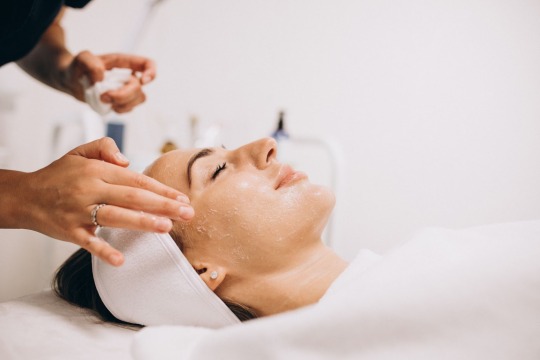
Laser Skin Treatment:
Laser treatment is like using a superhero light to fix your skin. The laser targets dark spots and makes your skin look fantastic. Lots of people in Hyderabad are choosing this treatment because it's quick and works wonders.
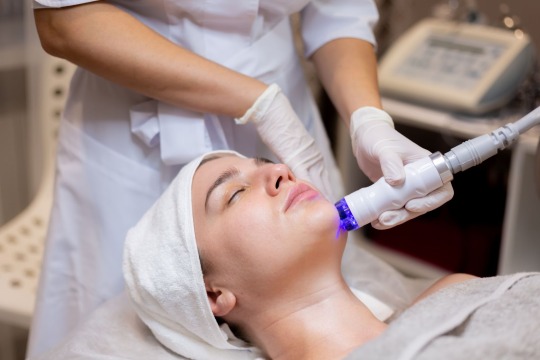
Microdermabrasion:
Microdermabrasion is like giving your skin a gentle scrub. Tiny crystals make your skin smoother and help with dark spots. People in Hyderabad really like this treatment because it makes their skin feel soft and look brighter.
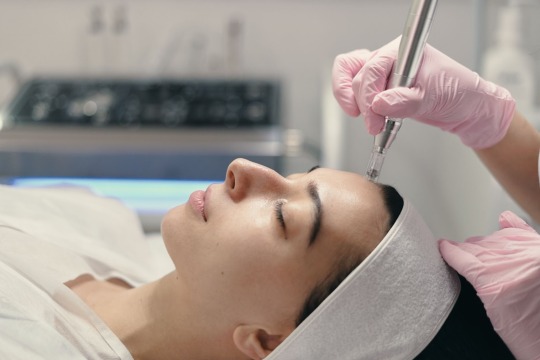
Creams from the Doctor:
Sometimes, doctors in Hyderabad give special creams to put on your skin. These creams have powerful ingredients that can help with dark spots. It's like having a secret weapon for your skin that your doctor gives you.
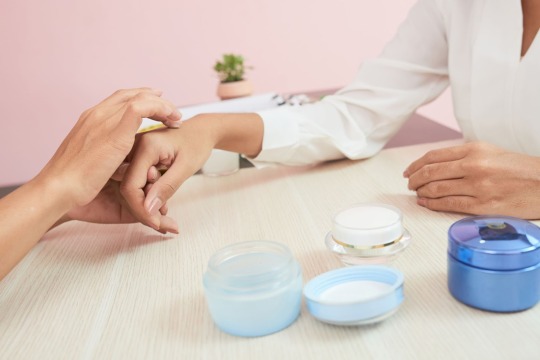
Freezing Treatment:
Freezing treatment is a cool way to deal with dark spots. It freezes them away, and people in Hyderabad like it because it's quick and works well for small spots.
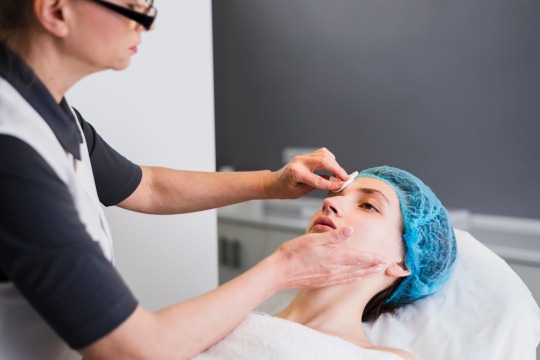
PRP Therapy:
PRP therapy is like giving your skin a boost from your own blood. They take a little bit of your blood, do some magic to it, and put it back on your skin. It's becoming popular in Hyderabad because it makes your skin look fresh and bright.
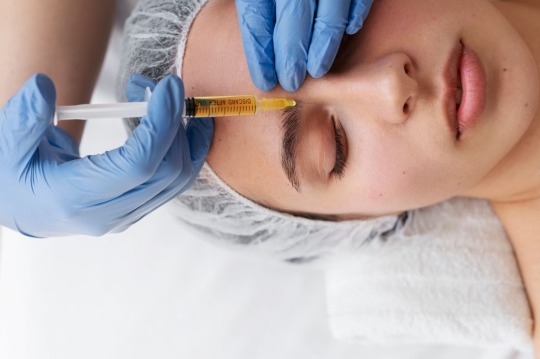
Choosing the Right Treatment:
Before trying any treatment in Hyderabad, it's important to talk to a skin expert. They will check your skin and help you choose the best treatment. Everyone's skin is different, so it's like finding the perfect fit for your skin.

Conclusion:
Hyderabad is a city where people love taking care of their skin. With easy treatments like chemical peels, lasers, and creams from the doctor, getting brighter skin is simple. Just talk to a skin expert, and soon your skin will be glowing like the beautiful city of Hyderabad! And for those looking for trusted skincare solutions, Dr. Venus is a brand that many in Hyderabad rely on for effective and gentle products. Consider exploring their range for a skincare routine that aligns perfectly with the charm of Hyderabad and leaves your skin feeling refreshed and radiant. Book an appointment now to start your journey towards healthier and brighter skin!
#Hyperpigmentation treatment#Skin whitening techniques#Pigmentation reduction method#Melasma treatment options#Lightening dark spots#Skin tone correction#Dermatological lightening treatments#Chemical peels for pigmentation#Laser skin lightening#Topical skin lighteners#Natural skin whitening remedies#Depigmenting agents#Vitamin C serums for brightening#Hydroquinone alternatives#Glycolic acid for pigmentation#Kojic acid products#Azelaic acid for skin lightening#Microdermabrasion for hyperpigmentation#Retinoids for even skin tone#Skin lightening creams#Intense pulsed light (IPL) therapy#Laser resurfacing for pigmentation#Dark spot correctors#Professional skin lightening treatments
0 notes
Text
Skin Lightening Products: Illuminating a $15 Billion Industry with Nuance and Complexity
The skin lightening products market, valued at a staggering $15 billion in 2023 and projected to reach $17.90 billion by 2032, presents a picture of undeniable market power. Yet, beneath the surface lies a tapestry woven with ethical intricacies, evolving regulations, and diverse consumer preferences. To truly understand this complex landscape, we must delve deeper, examining market size, share, trends, key players, and a crucial SWOT analysis.
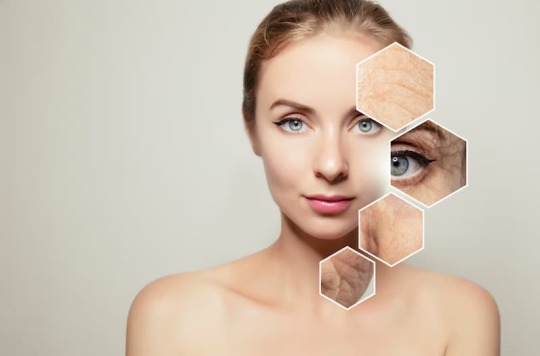
Mapping the Market: Global Reach, Regional Differences
While the $15 billion global market represents a significant presence in the beauty industry, its footprint across regions paints a nuanced picture. Asia Pacific reigns supreme, capturing a commanding 55% share. This regional dominance reflects cultural factors and established beauty standards, where lighter skin is often associated with desirability and status. North America, Europe, Latin America, and the Middle East & Africa follow, each with varying market sizes and dynamics shaped by cultural norms and regulations.
Shifting Sands: Market Trends Reshaping the Landscape
While traditional skin lightening creams and lotions remain prominent, several key trends are influencing the market's future trajectory:
The Natural Ingredient Craze: Consumers are increasingly seeking alternatives formulated with botanical extracts and vitamins, driven by concerns about the safety of synthetic ingredients.
Multi-Functional Marvels: Products that combine skin lightening with anti-aging or brightening benefits are gaining traction, offering a holistic approach to skincare.
E-commerce Boom: Online platforms are fueling market growth, particularly in emerging economies where access to physical stores is limited.
Ethical Awakening: Growing awareness of the potential health risks and cultural appropriation associated with skin lightening is sparking debates and influencing consumer choices.
Market Players: A Spectrum of Global Giants and Niche Contenders
The industry features a diverse cast of players, each vying for a share of the pie:

Global powerhouses like L'Oréal, Unilever, Procter & Gamble, Shiseido, and Beiersdorf leverage their vast resources and brand recognition to maintain a significant market share. They offer a wide range of products, catering to diverse consumer segments and price points.
Regional champions like Dabur, Emami, Himalaya, Goodal, and Hada Labo cater to specific regional preferences and cultural nuances. They often have a strong understanding of local ingredients and traditions, allowing them to develop products that resonate with regional audiences.
Niche players carve out space by focusing on specific aspects of the market. Some specialize in natural ingredients, catering to the growing demand for safe and sustainable alternatives. Others focus on specific skin types or concerns, offering targeted solutions.
A Cast of Players: Global Giants and Niche Contenders
The industry features a dynamic interplay between established players and ambitious newcomers:
Global Powerhouses: L'Oréal, Unilever, Procter & Gamble, Shiseido, and Beiersdorf leverage their vast resources and brand recognition to maintain a significant market share.
Regional Champions: Dabur, Emami, Himalaya, Goodal, and Hada Labo cater to specific regional preferences and cultural nuances, carving out their space within the global market.
Niche Players: These companies differentiate themselves by focusing on natural ingredients, catering to specific skin types, or prioritizing ethical sourcing practices.
Beyond the Numbers: A SWOT Analysis Unveils Complexities
Understanding the market's strengths, weaknesses, opportunities, and threats is crucial for navigating its complexities:

Strengths:
Large and established market with diverse product offerings cater to a wide range of consumers.
Growing online sales channels and increasing consumer demand present significant growth potential.
Potential for innovation with natural ingredients and multi-functional products can attract new customers.
Weaknesses:
Ethical concerns regarding cultural appropriation and potential health risks associated with certain ingredients continue to raise ethical dilemmas.
Stringent regulations and potential bans in some regions create market uncertainties.
Competition from alternative skincare solutions like BB creams and self-tanners poses a challenge.
Negative brand perception stemming from historical marketing practices can impact consumer trust.
Opportunities:
Addressing ethical concerns by developing safe, inclusive products and advocating for responsible sourcing practices can create a positive brand image.
Expanding into emerging markets with rising disposable incomes presents significant growth potential.
Leveraging online platforms and social media for targeted marketing and influencer collaborations can reach new audiences.
Collaborating with dermatologists and beauty influencers to build trust and address consumer concerns can create a positive impact.
Threats:
Increasing regulatory scrutiny and potential product bans could significantly impact market size and dynamics.
Negative publicity and consumer backlash due to ethical concerns pose a reputational risk.
Economic downturns impacting consumer spending on non-essential products could hinder growth.
Substitution by alternative skincare solutions with less controversial claims could erode market share.
The Road Ahead: Responsible Innovation and Ethical Considerations
The future of the skin lightening products market hinges on navigating a complex landscape. Addressing ethical concerns, developing safe and effective products, and promoting inclusivity will be crucial for brands to thrive. Consumers, armed with knowledge and empowered by ethical choices, can also play a critical role in shaping the future of this industry. Remember, market size and trends paint only part of the picture. Understanding the ethical complexities and diverse perspectives surrounding skin lightening is essential for a holistic and responsible approach.
#Skin Lightening Market#Skin Lightening Products Market#Skin Lightening Market Size#Skin Lightening Market Share#Skin Lightening Market Trends#Skin Lightening Market Major Players
0 notes
Text
Medhz’s Skin Lightening Serum
Medhz’s Skin Lightening Serum helps lighten skin tone and remove dark spots and pigmentation from the face. As dark spots make your skin appear dead, Medhz have created this unique elixir that is packed full of vitamin C and vitamin B3. By targeting the underlying layers of the skin and addressing the fundamental cause, the combination of these ingredients will make the skin appear youthful and free of any deeply rooted pigmentation.
0 notes
Text
should i get a foundation that actually matches my skin or should i get an even lighter one for a more cartoonish look .hm
#the one i have now looked good but ig i tanned a lot and stopped using the products that lighten my skin so. no longer good🎉#trying to develop my like drag look . it's not that serious why am i even so invested#2 is my lucky number
0 notes